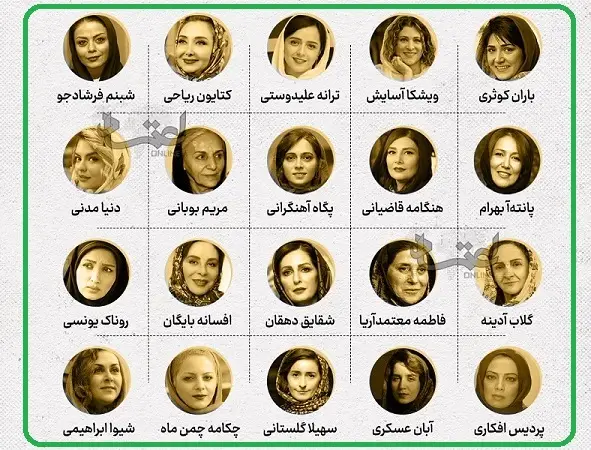Prominent actresses banned for hijab defiance and supporting protests say not acting is a choice they made to protect their professional dignity before being banned.
“My honor does not allow me to act in [Iran’s highly controlled] film industry. Who are you [to ban me]?” Katayoun Riahi said on Instagram in a post that included the photos of the twenty colleagues who were officially banned from acting earlier this week. “I never believed [in the necessity of wearing] the hijab to have ‘removed’ mine now,” she told Iran International TV in November.
“I said goodbye to the world of acting when I was in solitary confinement at Evin prison,” Hengameh Ghaziani, who has also been banned, wrote in an Instagram post. Referring to her interviews with Persian-language media outside Iran, Ghaziani was indicted for “contact with hostile and anti-revolutionary media”.
Pantea Bahram, another banned actress, said in an Instagram story after the release of the list that being banned is the least of her concern, with so many protesters still in prison, and when young girls and boys lost their eyes to the bullets of security forces during the crackdown on protesters in 2022 and 2023.
The ban has met much criticism from others in the film industry. “I feel ashamed of looking at the list in which there are the names of no men. I’m proudly standing with my [female] colleagues until they return [to work],” Mohammad Rezayi-Rad, theater director, announced on Instagram.


Iranian actresses are required to cover their hair in the films they play. The ministry enforces the hijab, as well as censorship of content, by rejecting scripts or modifying them and refusing a public screening license if a film does not meet their requirements.
Banned actresses expressed solidarity with protesters and the anti-hijab movement, often posting photos of themselves without headscarves during last year’s nationwide protests following Mahsa Amini’s death in custody.
Riahi, 62, and two other celebrity actresses, Golab Adineh and Fatemeh Motamed-Aria, also showed up with no headscarves at the funeral of popular film director, Kiumars Pourahmad, who tragically ended his own life in April.
Speaking to reporters on the sidelines of a cabinet meeting Wednesday Islamic Guidance Minister Mohammad-Mehdi Esmaili confirmed the ban earlier announced by a ministry official in charge of the film industry.
“We announced before that abidance by the hijab is a legal requirement … I have said several times that those who do not abide by the law cannot work [in the film industry],” Esmaili said.
The list of the banned actresses was released on the same day by the director of the supervision department of the ministry’s Cinema Organization, Habib Ilbeigi.
Some of these celebrities, including Riahi, were arrested for their hijab rebellion. Riahi had to apologize for her defiance under duress during her trial last December. Unable to bear the relentless psychological torment, she passed out and had to be taken to hospital by ambulance. The trial was being filmed, apparently for airing on the state television to discourage others from following suit.
Actresses’ open rejection of hijab led to some losing roles in TV sitcoms, the cancellation of entire shows, and censorship of their previous films.
In November last year, House of Cinema, formerly known as the Iranian Alliance of Motion Picture Guilds, said 100 filmmakers and other movie, music and theater personalities had been arrested or banned from work since the Mahsa Movement protests began in mid-September 2022.
